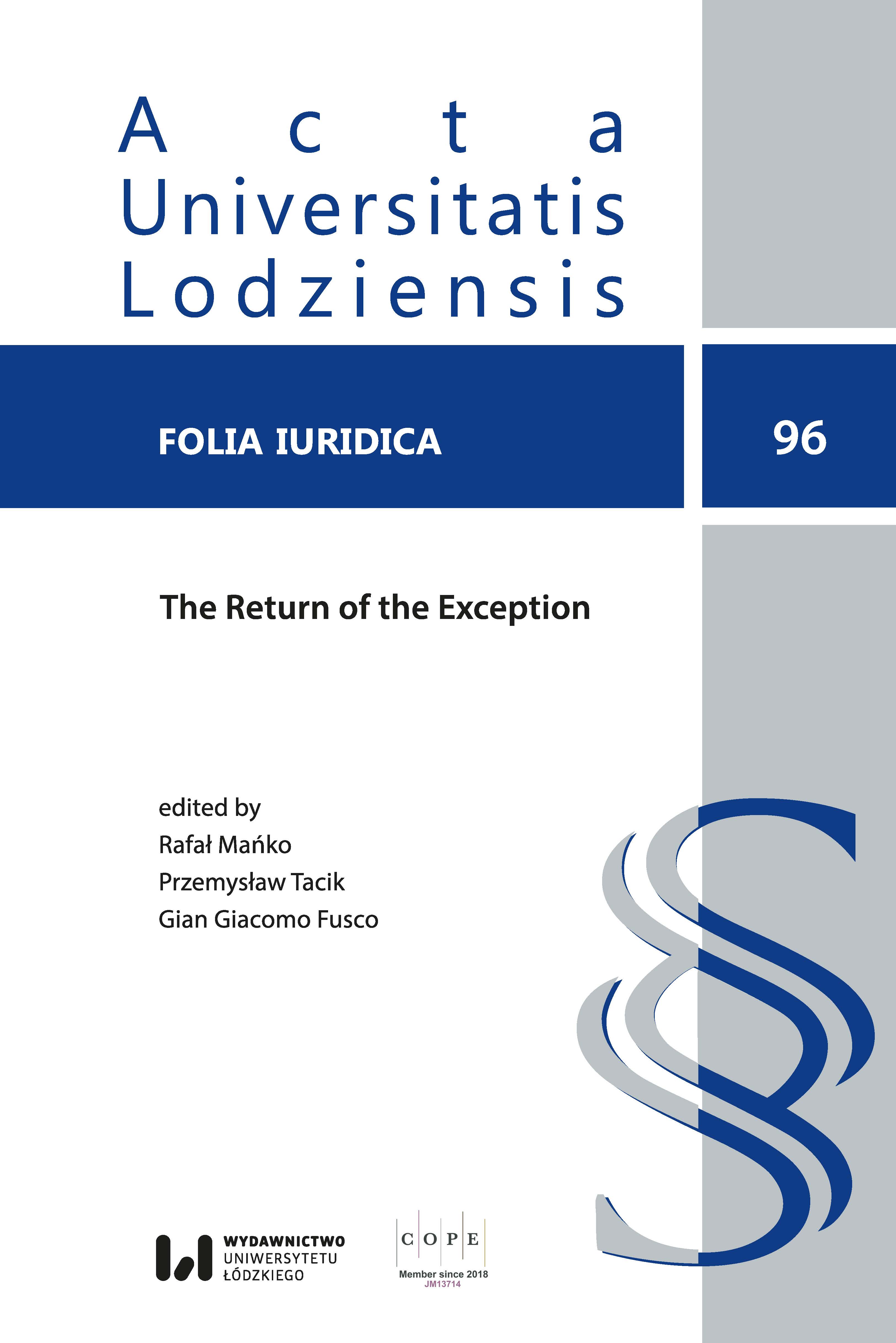The COVID-19 Crisis in Romania: A Hypothesis around Penal Populism and Legal Culture
DOI:
https://doi.org/10.18778/0208-6069.96.04Keywords:
COVID-19, Romania, penal populism, legal cultureAbstract
In this paper I seek to present a working hypothesis to be eventually developed in a future contribution, namely that the COVID-19 crisis exposed some problematic behaviours evocative of an authoritarian ethos on the part of both public authorities and citizens which suggest that a penal populist attitude might now be part or even embedded in the Romanian legal culture. Specifically, I will organize this contribution as follows: in the first part, I will briefly describe Romania’s reaction (as evidenced both in the official measures taken and the attitude of citizens) to the first wave of the pandemic focusing on the role of penal and military means; I shall qualify this reaction as containing some traces of penal populism. In the second part I shall offer a tentative mapping of the factors that can explain this problematic cultural reaction. Importantly, among these I include the successful fight against corruption with the consequence that what appears to have very much consolidated the rule of law in post-1989 Romania could be shown to have had the unintended and paradoxical effect of undermining the very same ideal.
Downloads
References
Anastasia, Stefano. Manuel Anselmi. 2018. “Penal Populism in the Multi-Populist Context of Italy.” In Multiple Populisms: Italy as Democracy’s Mirror. 164–178. Edited by Paul Blokker, Manuel Anselmi. London: Routledge. https://doi.org/10.4324/9781351115742-10
Google Scholar
DOI: https://doi.org/10.4324/9781351115742-10
Anastasia, Stefano. Manuel Anselmi. 2020. “Populist Punitiveness in the Italian Populistic Yellow-Green Government.” PArtecipazione e COnflitto 13(3): 1470–1486. https://doi:10.1285/i20356609v13i3p1469
Google Scholar
Bourdieu, Pierre. 1979. “Public Opinion Does Not Exist.” In Communication and Class Struggle 1. 124–130. Edited by Armand Mattelart, Seth Siegelaub. New York: International General.
Google Scholar
Cercel, Cosmin. 2018. Towards a Jurisprudence of State Communism. London: Routledge. https://doi.org/10.4324/9781315544113
Google Scholar
DOI: https://doi.org/10.4324/9781315544113
Cercel, Cosmin. 2021. “Law, Politics and the Military: Towards a Theory of Authoritarian Adjudication.” German Law Journal (forthcoming in October 2021).
Google Scholar
DOI: https://doi.org/10.1017/glj.2021.66
Friedman, Lawrence M. 1975. The Legal System: A Social Science Perspective. New York: Russell Sage Foundation.
Google Scholar
Grzyb, Magdalena. 2019. “Penal populism: Negotiating the feminist agenda. Evidence from Spain and Poland.” European Journal of Criminology, November 1, 2019. https://doi:10.1177/1477370819882912
Google Scholar
DOI: https://doi.org/10.1177/1477370819882912
Honig, Bonnie. 1999. “My culture Made Me Do It.” In Is Multiculturalism Bad for Women? 35–40. Edited by Susan Moller Okin. Princeton: Princeton University Press. https://doi.org/10.1515/9781400840991-005
Google Scholar
DOI: https://doi.org/10.1515/9781400840991-005
Iancu, Bogdan. 2020. “Status Quo Hegemony? Conflicting Narratives about the ‘Rule of Law’.” Verfassungsblog, October 6, 2020. https://verfassungsblog.de/status-quo-hegemony/ [Accessed: 17 June 2021]. https://doi:10.17176/20201006-124931-0
Google Scholar
Kenny, Paul. Ronald Holmes. 2020. “A New Penal Populism? Rodrigo Duterte, Public Opinion, and the War on Drugs in The Philippines.” Journal of East Asian Studies 20(2): 187–205. https://doi:10.1017/jea.2020.8
Google Scholar
DOI: https://doi.org/10.1017/jea.2020.8
Kopecký, Petr. 2003. “Civil Society, Uncivil Society and Contentious Politics in Post-Communist Europe.” In Uncivil Society? Contentious Politics in Post-Communist Europe. 1–18. Edited by Petr Kopecký, Cas Mudde. London: Routledge.
Google Scholar
Legrand, Pierre. 2011. “Siting Foreign Law: How Derrida Can Help.” Duke Journal of Comparative and International Law 21: 626–627.
Google Scholar
Mercescu, Alexandra. 2021. “Non sequiturs in Constitutional Adjudication: Populism or Epistemic Deficit?” In Populist Challenges to Constitutional Interpretation in Europe and Beyond. 194–216. Edited by Fruzsina Gárdos-Orosz, Zoltán Szente. London: Routledge. https://doi.org/10.4324/9781003148944-14
Google Scholar
DOI: https://doi.org/10.4324/9781003148944-14
Minetti, Marta. 2020. “The Facilitators Package, penal populism and the Rule of Law: Lessons from Italy.” New Journal of European Criminal Law 11: 335–350. https://doi.org/10.1177/2032284420946837
Google Scholar
DOI: https://doi.org/10.1177/2032284420946837
Nelken, David. 1996. “A Legal revolution? The judges and Tangentopoli.” In The New Italian Republic: From the Fall of the Berlin Wall to Berlusconi. 191–206. Edited by Stephen Gundle, Simon Parker. London: Routledge. https://doi.org/10.4324/9780203431443_chapter_12
Google Scholar
DOI: https://doi.org/10.4324/9780203431443_chapter_12
Pratt, John. 2007. Penal Populism. London: Routledge. https://doi.org/10.4324/9780203963678
Google Scholar
DOI: https://doi.org/10.4324/9780203963678
Pratt, John. Michelle Miao. 2017. “Penal Populism: The End of Reason.” Nova Criminis 9(13): 71–105.
Google Scholar
Roberts, Julian. Loretta Stalans. David Indermauer. Mike Hough. 2003. Penal Populism and Public Opinion. New York: Oxford University Press.
Google Scholar
Runciman, David. “Coronavirus has not suspended politics – it has revealed the nature of power.” The Guardian, March 27, 2020. https://www.theguardian.com/commentisfree/2020/mar/27/coronavirus-politics-lockdown-hobbes [Accessed: 17 June 2021].
Google Scholar
Downloads
Published
How to Cite
Issue
Section
License

This work is licensed under a Creative Commons Attribution-NonCommercial-NoDerivatives 4.0 International License.














